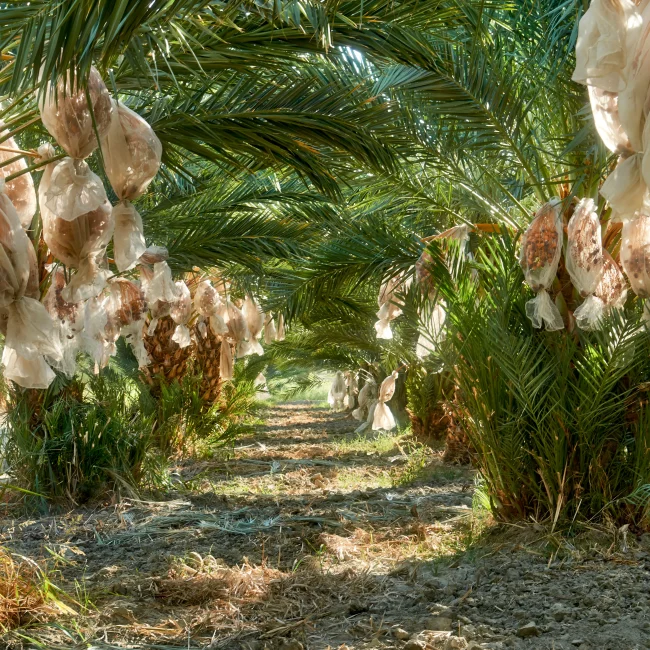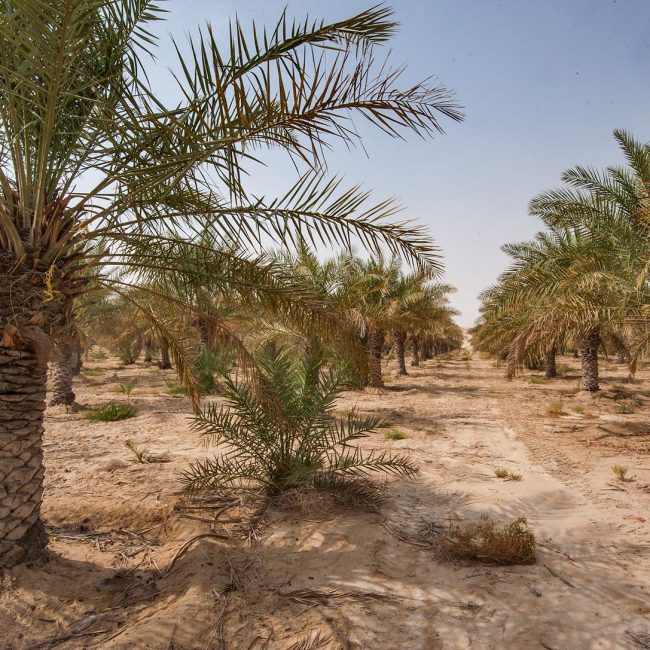Shopping Bag
No products in the cart.

Nestled in Southern California, surrounded by majestic mountains and characterized by a unique desert climate, the Coachella Valley is renowned for many things—music festivals, desert resorts, and its striking landscape. Yet, it is often overlooked for one of its most important distinctions: it is the Date Capital of the United States. The valley’s fertile soils, sun-drenched days, and the dedication of generations of farmers have made it one of the leading producers of dates in North America, supplying over 95% of the dates grown in the United States.
To truly understand the significance of the Coachella Valley as a hub for date production, it’s essential to delve into the rich history of date farming. Dates, a fruit synonymous with Middle Eastern and North African cultures, were not native to North America. The introduction of dates to California occurred in the late 19th century, when the U.S. Department of Agriculture sought to explore and cultivate desert-friendly crops.
The arid climate and rich alluvial soils of the Coachella Valley were identified as perfect for growing date palms. By the early 20th century, the valley had become a thriving center for date farming, bolstered by investments from farmers and the importation of high-quality date palm varieties, particularly Medjool and Deglet Noor.
As the decades passed, date farming became deeply rooted in the culture of Coachella Valley, turning this region into a vital part of America’s agricultural industry. Today, date farms span thousands of acres, and the industry supports the livelihoods of countless farmers and workers.
The success of date farming in the Coachella Valley can be attributed to several unique factors:
Climate: Dates thrive in hot, dry conditions, and Coachella Valley offers just that. With more than 300 days of sunshine per year and temperatures that soar above 100°F during the summer months, the valley provides the ideal climate for date palms to flourish.
Soil: The valley’s soil is rich in minerals and well-drained, ideal for date palm roots that require moisture but also thrive in sandy or loamy soil.
Water Supply: Despite its desert climate, the Coachella Valley benefits from a significant underground aquifer and an efficient irrigation system. The availability of water allows farmers to maintain date production without worrying about prolonged droughts.
While the Coachella Valley produces various types of dates, Medjool dates stand out as the region’s crown jewel. Often referred to as the “king of dates,” Medjool dates are known for their large size, soft texture, and intensely sweet flavor. These dates are rich in nutrients, offering a high concentration of fiber, potassium, magnesium, and antioxidants, making them a popular choice among health-conscious consumers.
The cultivation of Medjool dates requires both patience and skill. Medjool date palms take several years to mature before they can produce fruit, and the trees can grow up to 75 feet tall. Once the trees begin bearing fruit, they must be hand-pollinated, thinned, and protected from pests and environmental damage. Harvesting Medjool dates is a delicate process that often requires workers to climb the tall palms and carefully pick the ripe fruit by hand.
Among the numerous date farms that dot the Coachella Valley, Desert Sun Dates has established itself as a key player in the industry. Located in the heart of the valley, Desert Sun Dates is a family-owned farm that prides itself on producing high-quality Medjool dates using sustainable farming practices.
At Desert Sun Dates, the process of growing dates is not just a business—it’s a labor of love passed down through generations. The farm is committed to maintaining the valley’s agricultural heritage while embracing modern, eco-friendly practices to ensure that their dates are not only delicious but also environmentally responsible.
With rows of towering date palms stretching as far as the eye can see, Desert Sun Dates offers a glimpse into the world of date farming, where hard work, dedication, and tradition converge to produce some of the best dates in the world. The farm’s commitment to sustainability, organic farming, and quality has earned it a loyal following of customers who appreciate the authenticity and care that goes into each date.


Date farming is a unique agricultural process that requires a deep understanding of the palm trees and their needs. The journey of growing dates is a long one, taking several years from the initial planting of a seedling to the first harvest. The lifecycle of date farming at Desert Sun Dates provides an in-depth look at the hard work behind each Medjool date.
Planting: Date palms can be grown from seeds or offshoots. However, most commercial date farms, including Desert Sun Dates, prefer to use offshoots taken from mature palms. This method ensures that the new palms will be genetically identical to the parent tree, preserving the desired qualities of the fruit. The offshoots are carefully planted, and for the first few years, the young palms are nurtured with water, nutrients, and care.
Pollination: Date palms are dioecious, meaning that there are separate male and female trees. Since the wind is not reliable for pollination, farmers manually transfer pollen from male flowers to female flowers. At Desert Sun Dates, workers hand-pollinate the palms to ensure a successful fruit set.
Thinning: Once the flowers have been pollinated and the fruit begins to develop, it’s important to thin the clusters. By removing some of the developing fruit, the remaining dates can grow larger and sweeter. This labor-intensive process requires precision and care.
Harvesting: Date harvests at Desert Sun Dates take place in the late summer and early fall. Workers carefully climb the tall palms or use ladders to hand-pick the ripe dates. Each date is inspected for quality before being sorted, cleaned, and packed.
Post-Harvest: After harvesting, the dates are sorted by size and quality. Some dates may be dried to extend their shelf life, while others are packed fresh. At Desert Sun Dates, the dates are handled with care to ensure that they reach customers in perfect condition.
While traditional date farming methods have remained largely unchanged for centuries, Desert Sun Dates is leading the charge in implementing sustainable farming practices. The farm has adopted several initiatives to reduce its environmental impact and promote long-term agricultural health.
Water Conservation: One of the biggest challenges in date farming is water usage. Desert Sun Dates has implemented efficient irrigation systems, including drip irrigation, to ensure that the palms receive the water they need without wasting this precious resource. By targeting the roots of the palms, the farm can maximize water efficiency and reduce evaporation.
Organic Farming: At Desert Sun Dates, the use of chemical pesticides and fertilizers is avoided. Instead, the farm employs organic farming practices that promote soil health and protect the surrounding environment. The result is healthier trees, cleaner fruit, and a reduced environmental footprint.
Waste Reduction: Every part of the date palm is utilized at Desert Sun Dates. Even the byproducts of the harvesting process, such as fronds and seeds, are repurposed. This commitment to reducing waste is part of the farm’s broader sustainability efforts.
“Desert Sun Dates: Where Tradition Meets Innovation”
Beyond their economic importance, dates hold a special cultural significance in the Coachella Valley. Every year, the valley celebrates its date-growing heritage with the Riverside County Fair and National Date Festival, a tradition that has been going strong since 1921. This annual event attracts visitors from across the region and beyond, offering them the chance to sample different date varieties, enjoy live entertainment, and experience the local culture.
The festival highlights the role of date farming in shaping the valley’s identity, and it provides a platform for farmers like those at Desert Sun Dates to showcase their products. Visitors can learn about the farming process, taste fresh dates, and explore the history of the valley’s date industry.
Dates, particularly Medjool dates, are often hailed as a superfood due to their impressive nutritional profile. They are a rich source of dietary fiber, potassium, and antioxidants, making them an excellent addition to a balanced diet.
High in Fiber: Dates are a great source of dietary fiber, which aids digestion, promotes gut health, and helps regulate blood sugar levels. For individuals looking to improve their digestive health, dates provide a natural and tasty solution.
Rich in Potassium: Potassium is essential for heart health, and dates are packed with this important mineral. Eating dates regularly can help regulate blood pressure and reduce the risk of cardiovascular disease.
Antioxidants: Dates contain powerful antioxidants, such as flavonoids and phenolic acid, which help protect the body against inflammation and oxidative stress. These antioxidants play a crucial role in reducing the risk of chronic diseases, including heart disease, diabetes, and certain cancers.
Natural Sweetener: For those looking to reduce their sugar intake, dates offer a natural alternative to refined sugar. They can be used in baking, smoothies, and other dishes to add sweetness without the empty calories of processed sugars.
This guide takes a deep dive into the most popular types of dates grown in the Coachella Valley
The Best Medjool Dates in Coachella Valley: A Guide to Finding Fresh, Local Dates
dates are safe for dogs to eat in moderation, but they should not become a staple in your dog’s di

